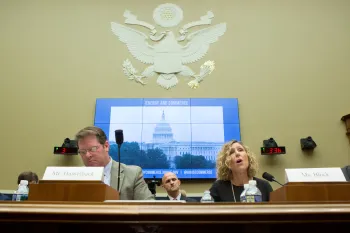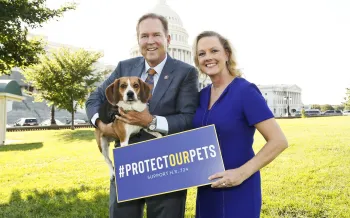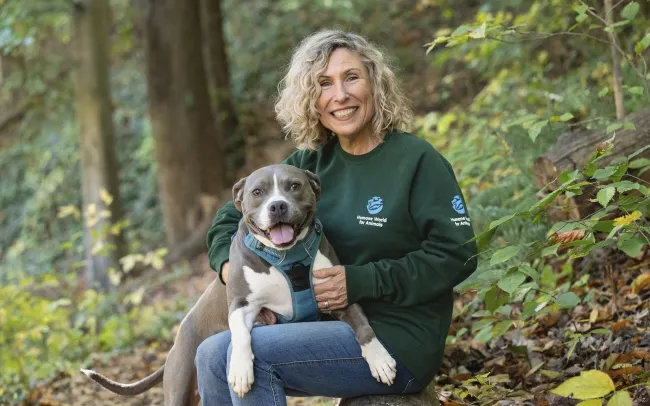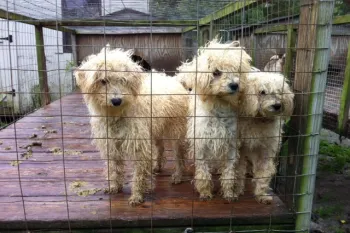Note: This blog is part of a series on ways we tackle the root causes of animal cruelty to create a more humane world for animals. For this post, Sara Amundson, president of Humane World Action Fund, joins me to tell the story of how we confront animal cruelty and suffering at the roots by changing laws and government regulations.
“Why isn’t this illegal?”
It’s a question we hear often from people who, upon learning about some form of heartbreaking animal cruelty, are rightfully outraged. There should be laws, they say, to prevent such abuse.
Of course, they’re right, and we have staff specialists who work tirelessly to make such laws a reality. This takes various shapes with our teams in countries all around the world, but in the U.S., our Humane World Action Fund works specifically on federal laws.
While the term “lobbying” may bring to mind images of slick-talking industry representatives and backroom deals on behalf of wealthy corporations, our lobbying on behalf of animals is a different breed altogether. On any given day, our policy teams are meeting with members of Congress, having conversations and building relationships in the halls of state capitols, testifying before legislative committees, building support for policies that will benefit animals and mobilizing opposition to bills that will harm them.
Through such interactions, elected officials learn about the suffering inherent to factory farming, trophy hunting, the fur trade, animal testing, puppy mills and other large-scale cruelties. We remind officials that most people abhor such abuses, and we describe the many ways that humane reforms serve the public interest.
Unfortunately, the industries that profit from cruelty are large and powerful, with paid lobbyists bent on fighting any change to the status quo. There are days when we feel like Sisyphus, the figure from Greek mythology who pushes a rock up a hill only to see it roll back down every time he nears the top. Or, perhaps an even more apt analogy for our work, like a pup chasing his own just-out-of-reach tail.
Take the issue of puppy mills. The U.S. is a nation of dog lovers, yet hundreds of thousands of puppies and their parents live in small, squalid cages in commercial breeding mills across the country. No reasonable person would consider these animals’ living conditions humane, but our attempts to pass a federal law, such as the Puppy Protection Act, to improve their quality of life have so far failed to come to fruition. But we will not give up.
At the same time, we know that whether we’re fighting puppy mills or other entrenched cruelties, we can’t place all our bets on one strategy or one piece of legislation. Every year, staff members of Humane World Action Fund and the Humane World for Animals State Affairs department lobby for a panoply of federal, state and local measures, chipping away at animal suffering from every angle. At the same time, our international teams are pushing for similar reforms in countries around the world.
Our work doesn’t end with the passage of humane laws: We have to ensure our hard-won reforms are implemented and enforced. Every year as Congress prepares its annual budget, we’re lobbying for funding and directives that will get the U.S. Department of Agriculture and other federal agencies at all levels to better implement and enforce animal welfare measures and to take concrete steps to strengthen their oversight of the industries they regulate.
It's a constant fight, and while every year brings disappointments, every year also brings victories that move us closer to our vision of a truly humane world.
For puppy mills, we’ve seen the payoff in higher care standards for commercial breeding facilities in several states and a raft of state and local laws making it harder for commercial breeders to profit from their cruelty. Since 2000, we have been able to boost funding for enforcement of the federal Animal Welfare Act to better regulate the treatment of animals at puppy mills, roadside zoos, animal research laboratories and more. We have also successfully pressed the USDA to take steps to improve some of the standards of care for the commercial dog breeders it regulates, such as requiring an annual veterinary exam and 24-hour access to fresh, clean water—a preview of the upgrades that would be made under the Puppy Protection Act if it passes.
We all want puppy mill, animal testing, trophy hunting and other cruelties ended today (preferably, yesterday). It takes perseverance and resilience to hammer away at these issues year after year. But with public opinion on our side, change will happen, and each of us can be part of it.
Even if your knowledge of how legislation works is limited, even if you eschew politics in every other realm of your life, we encourage you to get involved in our legislative work. You don’t have to delve into the minutiae to encourage your elected officials to support animal protection reforms.
As more of us get political for animals, we have no doubt that we will see the end of insidious and cruel industries such as puppy mills and hasten the realization of the humane world at the center of our vision.
You can sign up for our action alerts by entering your email at the bottom of our homepage.
Kitty Block is president and CEO of Humane World for Animals. Follow Kitty Block on X. Sara Amundson is president of Humane World Action Fund.



